Emma Haworth evaluation of Ecotrackers volunteer work
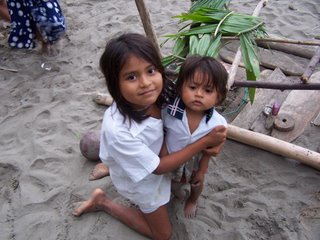
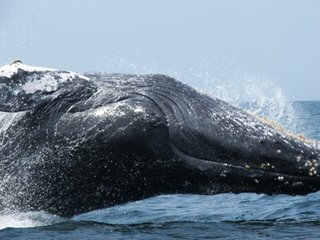
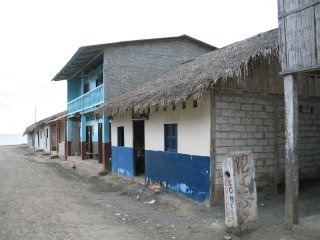
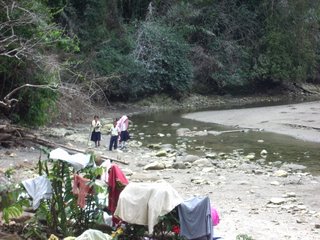
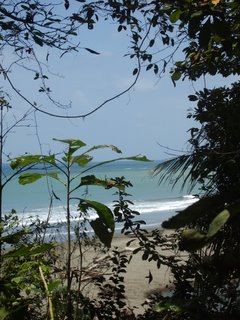
Emma Haworth evaluation of Ecotrackers volunteer work
Written by Emma Haworth Estero de Plátano is a small village on the north coast of Ecuador and is a place with much natural beauty. The village is situated on a picturesque beach with cliffs of rainforest that descend right down to the sea and rock pools that teem with sea life. There are whales, turtles, vultures, crabs and great sea food. Life in the village is pretty basic, with limited electricity, no running water and no telephones. People in the village are friendly and it didn´t take much time to feel comfortable with our host family and to get to know Elsa and her six beautiful children.
We intended to stay in Estero for about 3-4 weeks before volunteering in another community. However, one week in and we were frustrated with how things were going. In the short time we had spent in Estero, we had learnt a lot about the rewards and challenges of volunteering in Ecotrackers´ communities. We think it is important to talk about the challenges of volunteering as well as the rewards. So here is the story of some of our challenges.
There is an "association" of about four families in Estero who work hard with Ecotrackers on projects and who host volunteers. However, we got the impression fairly early on that the rest of the community was quite indifferent to our presence. Although people were friendly, no one talked about Ecotrackers´ projects or seemed to know much about them when we asked. More than this, Elsa told us that there were some tensions between her family and another family in the community and we wondered if this had anything to do with Elsa´s involvement with Ecotrackers.
Overall, we felt that if we were short term volunteers going to Estero we would have enough to do for a week. You can teach English in the local school, help clean the beach of driftwood and rubbish, water the village plant nursery, build signs for the road and help the family with the day to day running of the household. All of these things we did and found very rewarding, but for a volunteer staying longer we thought it would be frustrating. The purpose and aims of Ecotrackers pojects were not clear and there wasn´t much structure, organisation or continuation in the work being done in the community. Also, it became apparent that when volunteers were in Estero some members of the community felt they could sit back and let them do the work. For example, the head teacher of the school failed to turn up to classes for two days after he knew we were available to teach English. Elsa also said that the community doesn´t bother to clean the beach because they wait for volunteers to come and do it. There were also a number of mixed messages about what had and had not happened in relation to Ecotrackers projects, and what the community knew and did not know. It was hard to establish the truth about these things. It was therefore hard to know how to take things forward. It was also hard to see how development would happen in Estero and whether the work we did would make a difference.
We decided the best thing to do was to have a reunion with the community and speak to them directly. Luckily we had the support of one of the prominent members of the community who arranged a reunion. It was fairly daunting sitting in front of 30 or more strangers and raising these issues with them. We started by mentioning the lack of support for community projects and what seemed like a lack of information from Ecotrackers. We then went on to talk about the opportunities for Ecotourism. We also asked for their feedback on Ecotrackers´ projects, as we were curious to know what the community thought of them and the volunteers. A few people made comments but only a small number. One woman commented that volunteers had stayed in her house for a few days but she had no idea what work they had done. From this we realised that it might not be clear to community members who are volunteers and who are eco-tourists.
Over the course of the reunion, people seemed to be interested in what we had to say and a few heads were nodding. At the end of the meeting we sat down with the key members of the community to write down all the projects happening in Estero. When we left, we felt the meeting had been successful and were hopeful about some change. However, Elsa feared that whilst the community seemed positive in the reunion, she knew from past experience that often nothing changed. Hearing this, we felt a bit overwhelmed by the difficulties we faced. We finally decided the best thing to do would be to return to Quito to discuss things with Ecotrackers.
It was sad saying goodbye to Elsa and the kids but we knew we would return. Before we left we made a record of all the issues in the community we thought affected the progress of Ecotrackers´ projects and took with us the list of current projects we had made at the reunion. Back in Quito we met with the Director of Ecotrackers, Max, and the Director of Projects, Andy, who were grateful for our feedback and at the same time not too surprised by it. They acknowledged the need to give more information and support to the community. They told us about of the history and culture of Estero, which helped us to understand some of the reactions of the community to volunteer projects. They also agreed to support us in trying to tackle some of the issues through re-informing the community about Ecotrackers, building more structure into plans for Ecotrackers´ projects, making provisions for a community fund and most importantly holding another reunion with the community to talk about all of this.
Back in Estero we gave the village director invitations to the reunion for each member of the community and gave some out our ourselves. The day of the reunion arrived and a large number of people were present. Max and Andy both attended and their presence was appreciated by the community. A number of things were discussed including attitudes towards change and development, what Ecotrackers aims to do and how, the potential for ecotourism and the suggestion of a community fund. Interestingly the community fund idea was rejected because the association of families currently working with Ecotrackers felt that they would be doing all the work but the community would all benefit from it. Also, although we had made plans for a step by step process to increase community involvement in the projects, in the end it was decided that the members of the community who wanted to work with Ecotrackers would need to join with the association of families on their own initiative.
The moral of this story is that you can´t always make changes in communities that you think are best. You can not assume or anticipate what a community will want and you have to be ready to listen to them. Development will never happen fast and members of the community may need time and some faith that working with an NGO will benefit them. The best that we can do is to understand how a community operates, to inform them as best we can, make offers and suggestions and then observe their willingness to work with us. However, one of the questions we are left with is how to help a community to develop without imposing some of the things that will lead to development such as structure, organisation and planning that may not be a part of a their culture?
Estero de Plátano is a small village on the north coast of Ecuador and is a place with much natural beauty. The village is situated on a picturesque beach with cliffs of rainforest that descend right down to the sea and rock pools that teem with sea life. There are whales, turtles, vultures, crabs and great sea food. Life in the village is pretty basic, with limited electricity, no running water and no telephones. People in the village are friendly and it didn´t take much time to feel comfortable with our host family and to get to know Elsa and her six beautiful children.
We intended to stay in Estero for about 3-4 weeks before volunteering in another community. However, one week in and we were frustrated with how things were going. In the short time we had spent in Estero, we had learnt a lot about the rewards and challenges of volunteering in Ecotrackers´ communities. We think it is important to talk about the challenges of volunteering as well as the rewards. So here is the story of some of our challenges.
There is an "association" of about four families in Estero who work hard with Ecotrackers on projects and who host volunteers. However, we got the impression fairly early on that the rest of the community was quite indifferent to our presence. Although people were friendly, no one talked about Ecotrackers´ projects or seemed to know much about them when we asked. More than this, Elsa told us that there were some tensions between her family and another family in the community and we wondered if this had anything to do with Elsa´s involvement with Ecotrackers.
Overall, we felt that if we were short term volunteers going to Estero we would have enough to do for a week. You can teach English in the local school, help clean the beach of driftwood and rubbish, water the village plant nursery, build signs for the road and help the family with the day to day running of the household. All of these things we did and found very rewarding, but for a volunteer staying longer we thought it would be frustrating. The purpose and aims of Ecotrackers pojects were not clear and there wasn´t much structure, organisation or continuation in the work being done in the community. Also, it became apparent that when volunteers were in Estero some members of the community felt they could sit back and let them do the work. For example, the head teacher of the school failed to turn up to classes for two days after he knew we were available to teach English. Elsa also said that the community doesn´t bother to clean the beach because they wait for volunteers to come and do it. There were also a number of mixed messages about what had and had not happened in relation to Ecotrackers projects, and what the community knew and did not know. It was hard to establish the truth about these things. It was therefore hard to know how to take things forward. It was also hard to see how development would happen in Estero and whether the work we did would make a difference.
We decided the best thing to do was to have a reunion with the community and speak to them directly. Luckily we had the support of one of the prominent members of the community who arranged a reunion. It was fairly daunting sitting in front of 30 or more strangers and raising these issues with them. We started by mentioning the lack of support for community projects and what seemed like a lack of information from Ecotrackers. We then went on to talk about the opportunities for Ecotourism. We also asked for their feedback on Ecotrackers´ projects, as we were curious to know what the community thought of them and the volunteers. A few people made comments but only a small number. One woman commented that volunteers had stayed in her house for a few days but she had no idea what work they had done. From this we realised that it might not be clear to community members who are volunteers and who are eco-tourists.
Over the course of the reunion, people seemed to be interested in what we had to say and a few heads were nodding. At the end of the meeting we sat down with the key members of the community to write down all the projects happening in Estero. When we left, we felt the meeting had been successful and were hopeful about some change. However, Elsa feared that whilst the community seemed positive in the reunion, she knew from past experience that often nothing changed. Hearing this, we felt a bit overwhelmed by the difficulties we faced. We finally decided the best thing to do would be to return to Quito to discuss things with Ecotrackers.
It was sad saying goodbye to Elsa and the kids but we knew we would return. Before we left we made a record of all the issues in the community we thought affected the progress of Ecotrackers´ projects and took with us the list of current projects we had made at the reunion. Back in Quito we met with the Director of Ecotrackers, Max, and the Director of Projects, Andy, who were grateful for our feedback and at the same time not too surprised by it. They acknowledged the need to give more information and support to the community. They told us about of the history and culture of Estero, which helped us to understand some of the reactions of the community to volunteer projects. They also agreed to support us in trying to tackle some of the issues through re-informing the community about Ecotrackers, building more structure into plans for Ecotrackers´ projects, making provisions for a community fund and most importantly holding another reunion with the community to talk about all of this.
Back in Estero we gave the village director invitations to the reunion for each member of the community and gave some out our ourselves. The day of the reunion arrived and a large number of people were present. Max and Andy both attended and their presence was appreciated by the community. A number of things were discussed including attitudes towards change and development, what Ecotrackers aims to do and how, the potential for ecotourism and the suggestion of a community fund. Interestingly the community fund idea was rejected because the association of families currently working with Ecotrackers felt that they would be doing all the work but the community would all benefit from it. Also, although we had made plans for a step by step process to increase community involvement in the projects, in the end it was decided that the members of the community who wanted to work with Ecotrackers would need to join with the association of families on their own initiative.
The moral of this story is that you can´t always make changes in communities that you think are best. You can not assume or anticipate what a community will want and you have to be ready to listen to them. Development will never happen fast and members of the community may need time and some faith that working with an NGO will benefit them. The best that we can do is to understand how a community operates, to inform them as best we can, make offers and suggestions and then observe their willingness to work with us. However, one of the questions we are left with is how to help a community to develop without imposing some of the things that will lead to development such as structure, organisation and planning that may not be a part of a their culture?
COMENTARIO DE ECOTRACKERS
This recomendations were used to stop influence of two international volunteers. They worked with us for long time and they had total control of the the foundation. Now, They have other fondation in Quito, using our information, visa, communities and some teachers of Ecotrackers.
Comments